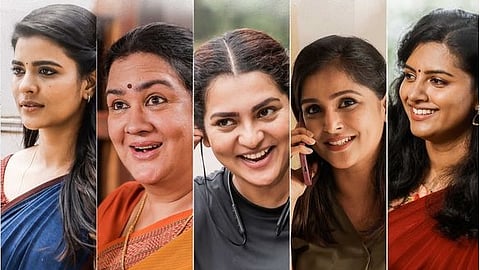Her review: This anthology is a breezy take on the diverse lives of five women
Her (Malayalam)(3 / 5)
At the end of Her, a tastefully knit anthology on five women and the people around them, you imagine its writer with a thread in one hand and scattered stories in the other, poking little holes along the way to sew them together. Something about the format of an anthology, of seemingly disjointed characters, makes you fish for the slightest link from one story to another, and Her has these moments in every segment. Sculpting these five characters from varied cross sections and ages, with very distinct issues, writer Archana Vasudev leaves space for the women to cross each other’s paths, though only for a few unremarkable moments. They don’t have to, the film would still say what it sets out to, just that the presence of these characters in each other’s lives can remind you of the unknown ways humans touch one another, sometimes just as passersby.
Her, with its breezy stories and clear stances, is still lighthearted, not pulling you down by its weighty themes. It has its flaws and takes you needn't agree with. But it's comforting enough to just watch five women simply go through a difficult day, and find peace at the end of it.
Lijin Jose, directing the anthology, does not split the segments with new titles or a break of screen. The film opens with close-up shots of ants on a wall, and a piece of sinister music (Govind Vasantha’s mood-aiding BGM) warns you that these little guys are trouble. As Aishwarya Rajesh takes up the screen and makes a call, as she gets on a rick and rides uncomfortably, it makes you wonder if the ants are a symbol of all the troubles looming around a woman on an average day, from the driver adjusting his mirror to the pervert blocking her way on the road. She appears to be from a middle-class background, living away from the city, waiting for the bus, and trying hard for a job.
The other women, some self-built and others privileged, appear well-off, dealing with life in the different ways they have learnt to. Archana and Lijin do not make the women all nice and warm. Remya Nambeesan appears on the screen, gorgeous but unlikeable, as the stereotype of a petty, obnoxious social media influencer. The hypocrisy with which she makes her reels can be a caricature of infamously viral online gurus.
If Aishwarya’s segment seemed a little scripted – especially the phone conversation at the beginning – Remya’s, even with her convincing act, is a tad loud in its attempt to be a satire. Calming the air like a much-awaited breeze flows in Urvashi in a red Sari, announcing the time aloud for her husband with his little quirks. Pratap Pothen, in one of his final acts, looks older than his 60-something years, but adorable in his ways. The couple is too precious, in their set ways, making it therapeutic just to watch them carry on with their mornings and nights. But bringing a twist that actually makes jealousy look cute, you have technology popping up between the two of them like a grinning villain.
The breeze does not last long and almost symbolically, the scene appears to turn upside down as Lijomol Jose is propped up on a bed with her legs perched on the wall. Must be her comfort position, you gather, as she lets her wandering thoughts fall into place and takes a decision on a confusing little matter. Interesting as it is, this one is a bit of a let-down, not convincing in its attempt to make a point about women’s autonomy.
Then there is Parvathy Thiruvothu, whose vague pink figure we’d already marked in the backdrop of the other segments, excited to glimpse one character in another’s story, without either of them really noticing it. If Urvashi’s segment was a breeze, Parvathy’s is a bit of a storm that you hope will soon settle. Both actors, fresh after their commendable performance together in Ullozhukku, demonstrate again, in their distinct ways, why they are both precious for Malayalam cinema. Parvathy’s character is nearly the opposite of Urvashi’s, modernities enveloping her routine, as she fights her own battles and builds a future. She nearly reminds you of a robot when bad news transforms her, like the click of a button, from a pleasant young woman to a selfish snob. But those are the pluses in the script– laying out the vulnerabilities, the unpleasantness, the many flaws that women come with, as all humans do, not always needing backstories.
Archana’s script also does not do the boring job of connecting the dots, explaining the unsaid middle parts like a schoolteacher with chalk in her hands. She lets you have the satisfaction of sleuthing and solving what's not spelled out. And by then, the thread that you imagine Archana took through the holes she poked would have made a full circle.
The film is streaming on Manorama Max.
Disclaimer: This review was not paid for or commissioned by anyone associated with the film. Neither TNM nor any of its reviewers have any sort of business relationship with the producers or any other members of its cast and crew.

